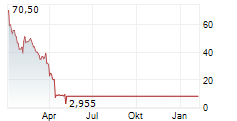
WASHINGTON (dpa-AFX) - Palatin Technologies Inc. (PTN) announced that its BMT-801 Phase 2 obesity co-administration study met its primary endpoint and was highly statistically significant. The company reported positive topline data with co-administered melanocortin-4 receptor (MC4R) agonist bremelanotide plus glucagon like peptide-1/gastric inhibitory polypeptide (GLP-1/GIP) tirzepatide and highlighted next steps in its obesity program for its novel next-generation MC4R long-acting peptides and oral small molecules.
The data results from the study were highly statistically significant for the study's primary endpoint, which was percent weight loss in patients for the co-administration of MC4R agonist bremelanotide plus GLP-1/GLP tirzepatide compared to placebo, over the 8-week treatment period.
The co-administered group had a 4.4% reduction in weight compared to 1.6% for the placebo group.
The primary analysis for additive effect demonstrated that 40% of patients in the co-administered group achieved a 5% reduction in their body weight, compared to 27% for the tirzepatide alone group; 27% of patients in the co-administered group achieved a 6% reduction in their body weight, compared to 13% for the tirzepatide alone group; 19% of patients in the co-administered group achieved a 7% reduction in their body weight, compared to 0% for the tirzepatide alone group.
The primary analysis for additive effect demonstrated that increase in the percent of subjects on co-administration achieving 5%, 6% and 7% weight loss over tirzepatide alone, indicates that co-administration had a synergistic effect.
In the study, patients first received a four-week treatment with tirzepatide alone (2.5 mg weekly) to confirm eligibility. They were then randomly assigned to one of four treatment groups for an additional four weeks: co-administration of MC4R bremelanotide (1.25 mg daily) and GLP-1/GIP tirzepatide (2.5 mg weekly), tirzepatide alone (2.5 mg weekly), bremelanotide alone (1.25 mg daily), or a placebo. A total of 113 patients were enrolled, with 96 randomized in a 3:1 ratio. Specifically, 46 patients were assigned to the MC4R plus GLP-1/GIP co-administration group, while the remaining arms had 15 to 16 patients each.
The company noted that more than 50% of the lost weight was regained within two weeks after treatment cessation in both the co-administration group and the tirzepatide-only group, a common occurrence following the discontinuation of GLP-1/GIP therapy. The data indicated that weight regain was effectively halted in the MC4R agonist bremelanotide group. Additionally, co-administration of the MC4R agonist with the GLP-1/GIP therapy showed no increase in safety or tolerability concerns among patients.
Palatin said it is advancing the development of its next-generation MC4R long-acting peptide and oral small molecule compounds for the treatment of general obesity, weight loss management, acquired and congenital hypothalamic obesity, and potentially, rare/orphan genetically caused MC4R pathway diseases. These therapies are being explored as stand-alone treatments, as well as in combination with GLP-1/GIP (incretin therapy), and as monotherapy for multiple genetic obesity disorders. Investigational New Drug (IND) applications are expected to be submitted in the fourth quarter of calendar 2025, with clinical data expected in the first half of calendar year 2026.
For More Such Health News, visit rttnews.com.
Copyright(c) 2025 RTTNews.com. All Rights Reserved
Copyright RTT News/dpa-AFX
© 2025 AFX News



